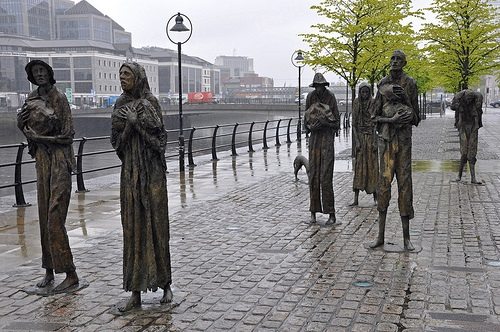
April 9, 2013; Chatham House
We found this very interesting report on the Rockefeller Foundation blog. It suggests foundations have something to read and to learn about responses to famine. It struck us as interesting because of the contrast with the typical focus on devastating disasters, such as the earthquake in Haiti or the multiple hurricanes that have hit New Orleans. Those disasters are quick and short, although their impacts can last a long time. Famines are “slow-onset disasters” capable of being monitored, anticipated, and forecast due to early warning systems that track risk factors like food prices, crop production, and health indicators.
If the immediacy of a Hurricane Katrina or a Superstorm Sandy surprises and overwhelms the preparations of FEMA or state and local governments, one might think it understandable, sort of, but wouldn’t the slow-moving nature of famines make it easier for governments and aid donors to intervene? Unfortunately, there are numerous examples of famines in the Sahel, Somalia, and elsewhere where the early warning information somehow didn’t translate into early and timely action.
The report suggests that early warning systems for anticipating famine work well as predictors, but fail to stimulate preemptive action. According to the authors, “The long lead times offered by famine early warning systems provide the opportunity for decisive early action, but also the opportunity for prevarication, delay, and buck-passing.”
Sign up for our free newsletters
Subscribe to NPQ's newsletters to have our top stories delivered directly to your inbox.
By signing up, you agree to our privacy policy and terms of use, and to receive messages from NPQ and our partners.
As with the disaster responses in Haiti and New Orleans, the report takes the cacophony of aid providers as part of the problem: “These ‘delay dynamics’ are magnified by a disparate collection of responders and deep accountability deficit. The users of early warnings are numerous and fragmented. They include at-risk populations, local authorities, national governments, national and international NGOs, UN agencies and donor governments. These have differing interests and priorities and weak lines of communication.”
As with the plainly ineffective response to inner-city New Orleans, at least in the earliest days of hurricane assistance, “[i]n the absence of strong accountability to vulnerable populations, governments do not give priority to humanitarian needs. Political risk trumps humanitarian risk….For donors and national governments, delay is often a politically rational strategy.”
The errors that donor countries and donor agencies make include these:
- “Donor governments are reluctant to devolve decision-making to those on the ground. The United States and EU institutions refuse to fund country-level pooled funds”.
- “The 2011 Somalia famine was made more, not less, likely by donor attempts to manage political risks.”
- “Governments in at-risk countries may attach low priority to the needs of poor or marginal communities when deciding how to allocate public funds or whether to respond to early warnings.”
Those sound like messages that could have been given to foundations in New Orleans and Mogadishu equally. The specific recommendations have meaning for U.S. foundations:
- “Donors, agencies, and national government should invest in community-based early warning systems and capacity building, particularly in national contexts of low government capacity or where communities are politically marginalized.
- National and local governments should create an enabling environment for community-based early action by ensuring that policies and regulations support the response strategies of vulnerable groups.
- National governments, early warnings providers, and agencies should develop innovative approaches to increase community access to official early warning information and tailor it to their specific needs.
- Encourage closer integration of humanitarian and development work by bringing humanitarian and development funding decision-making closer together (as Spain and the United States are attempting to do), experimenting with joint humanitarian/development strategies with common goals and objectives, and earmarking funding for integrated projects or programs.
- Foster cooperation between agencies by favoring joint programs and proposals, funding interagency response analysis, and agreeing to transparent and objective funding criteria that clarify when particular interventions are warranted.”
It’s one thing to be in and out for a reasonably brief natural disaster. For famines, the engagement of foundations may be a prolonged process, but the thought process is similar: Build local capacity and hold government (and other players) responsible to vulnerable populations.—Rick Cohen












